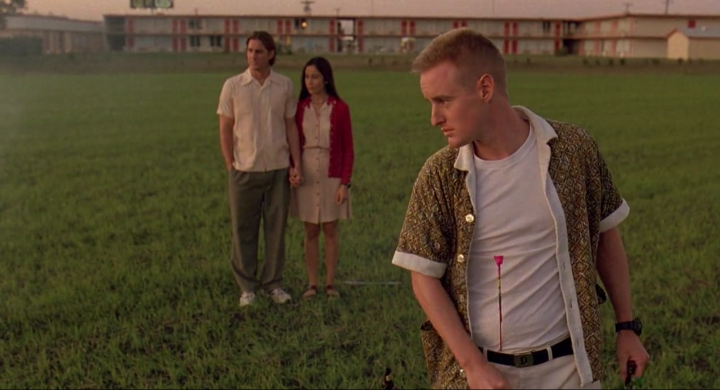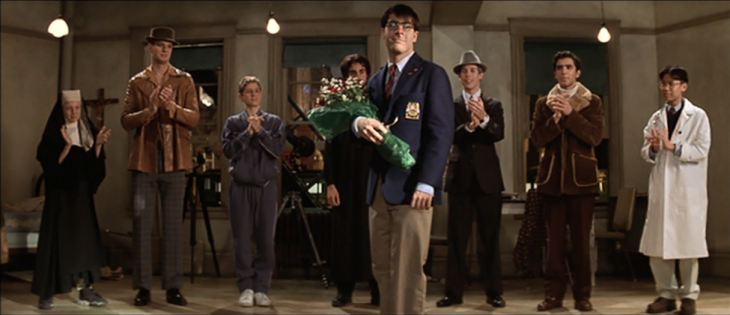
It isn’t often that a director’s first two films are as representative of his career to come. It’s even harder to find a start as emotionally naked as Wes Anderson’s one-two punch of Bottle Rocket (1996) and Rushmore (1998). Playing back-to-back at The Marquee Theater this Friday July 25, the double feature falls in step with UW Cinematheque’s affinity for the obscure and unappreciated. It’s also a perfect entry point into the career of America’s most popular arthouse director today.
Bottle Rocket isn’t close to Wes Anderson’s best, but 18 years later, the director’s feature-length debut remains valuable for just how personal it is. Shot entirely in Texas — and largely in the Dallas-Fort Worth Area — Bottle Rocket cans Anderson’s Texas roots inside a meandering buddy film. Subtitles are eschewed for Spanish-speaking characters, and the general Tex-Mex flavor resembles nothing of the Francophilia Anderson clings to in his later pictures. In what would be the first of four collaborations, Devo’s Mark Mothersbaugh seasons his score with mariachi-styled guitar pluckings and nearly every vignette is set in a townie bar, a mansion in the Texas suburbs, or a roadside motel. Given the fairybook settings and far-off European vistas Anderson would go on to visit, the overwhelmingly Southern flavors play like a farewell postcard to his hometown.
Bottle Rocket is also a farewell to Anderson himself — part of him, at least. Its half-assed heist premise dances around the headstrong Dignan (Owen Wilson) and the despondent Anthony (Luke Wilson). Dignan plans to impress James Caan’s Mr. Henry by robbing a cold storage facility, but the very aimlessness that unites the Wilson brothers with Robert Musgrave’s getaway driver is the same quality that drives the bungling trio apart, with Anthony and Dignan standing in for separate sides of Anderson’s own persona. Recently “freed” from the mental health clinic he checked himself into, Anthony is despondent and vulnerable to his own emotions. Unsure of how to start over following a nervous breakdown, he falls head over heels for housekeeper Inez (Lumi Cavazos) while hiding out at a motel. Not to mention, Anthony is consumed by the notion that adults can’t return home; if you squint, the long-haired Luke Wilson even resembles Anderson himself.
Owen Wilson’s Dignan is far more self-assured. Outwardly, his military haircut and insistence on leading the group are temporary distractions from his glaring lack of qualifications. Because inside, Dignan is a chaotic mess, concocting poorly planned heists and hashing out 75 year “life plans” in wide-ruled notebooks. He plays the part, but Dignan’s only modus operandi is to appear like he has one.
If not an intentional mirror, Anthony and Dignan indirectly represent the director at a crossroads. One half possesses grand vision, the other a measured hand to ground it. Anthony and Dignan’s qualities should result in a successful final job, but Bottle Rocket puts the two at odds, fighting over romance and conflicting priorities, with many conversations doubling as the internal conflict of a director on his first job — one funded by the money of industry notables like James L. Brooks. Dignan and Anthony find understanding in their friendship by the end, but the shaky resolution and the place in which the story concludes make for a quietly devastating moment, an unspoken acknowledgement that reluctance and ambition can’t always play together.

Rushmore is a far stronger film, and one I suspect won’t paint Bottle Rocket in a comparatively favorable light. Anderson’s flat staging, muted emotional timbre, and off brand humor are more realized in his sophomore effort. (Although a silver lining in this double feature might be its illustration of Anderson’s growing stylizations.)
Rather than a split reading of Anderson, Rushmore presents a singular proxy in Jason Schwartzman’s Max Fischer, Rushmore Academy’s 15 year old Renaissance man who’s literally a stage director in his own right. He’s also 37 other things in his endless string of extracurricular commitments, none of which come close to resembling “model scholar.” As Rushmore’s headmaster Nelson Guggenheim (Brian Cox) puts it, Max is “one of our worst students” and like Owen Wilson’s Dignan, Schartzman plays the character with his eyes towards the stars. “Harvard’s my safety school,” he tells Miss Mary Cross (Olivia Williams), a teacher at Rushmore and the object of both Max’s and lonely industrialist Herman Blume’s (Bill Murray) affections. Ivy League may be a standby for Max right now, but he’s more preoccupied with the trappings of success than actually putting the work in.
Max’s obsessions move from his latest stage play (an adaptation of Serpico for the Max Fischer Players) to impressing Miss Cross to exacting revenge for Mr. Blume’s competing advances to, finally, resigning himself to the life of a barber’s son. He’s a dreamer bereft of any discipline, for what are the odds a teacher falls in love with an impatient 15 year old? Romance or otherwise, Max’s eyes are far too big for his stomach, and in his gaudy, micromanaged projects, he presents a connection with Anderson’s own ego-checking. Max’s barrage of stage adaptations only grow bigger in scale and more costly in production value, and his elders constantly remind him he’s too ambitious, too unfocused, and most importantly, too young. It may be why Max spouts off sic transit gloria (“glory fades”) like it’s going out of style. His mother’s gravestone reads likewise: “The paths of glory lead but to the grave.”
For an Anderson picture, Rushmore has a morbid focus on legacy, one that’s borne out of fears of inadequacy. Rushmore isn’t any way near the hilariously preposterous scale of Max’s final play, “Heaven and Hell,” the successful debut of which rebuilds the bridges Max has burned over the last four months (The healing power of entertainment anyone?). What Rushmore is though is an alleviation of the director’s anxieties, a deep breath and a means of checking his ego before his sophomore step. Bottle Rocket was by no means a smash success of a debut, but Rushmore makes it clear Anderson ultimately directs for himself and to the beat of his own drum.
- Bottle Rocket (7:00p) and Rushmore (9:00p) play FREE at The Union South Marquee this Friday.
